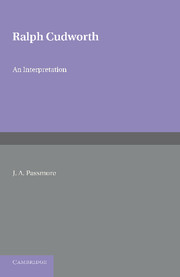Book contents
- Frontmatter
- Contents
- Preface
- Abbreviations
- CHAPTER I Cudworth and his Predecessors
- CHAPTER II Cudworth on Mind and Nature
- CHAPTER III Cudworth's Theory of Knowledge
- CHAPTER IV ‘Eternal and Immutable Morality’
- CHAPTER V Cudworth's Moral Psychology
- CHAPTER VI The Good Life
- CHAPTER VII Ethics and Religion
- CHAPTER VIII Cudworth and the British Moralists
- Appendix: The Cudworth Manuscripts
- A Cudworth Bibliography
- Index of Names
CHAPTER V - Cudworth's Moral Psychology
Published online by Cambridge University Press: 05 June 2016
- Frontmatter
- Contents
- Preface
- Abbreviations
- CHAPTER I Cudworth and his Predecessors
- CHAPTER II Cudworth on Mind and Nature
- CHAPTER III Cudworth's Theory of Knowledge
- CHAPTER IV ‘Eternal and Immutable Morality’
- CHAPTER V Cudworth's Moral Psychology
- CHAPTER VI The Good Life
- CHAPTER VII Ethics and Religion
- CHAPTER VIII Cudworth and the British Moralists
- Appendix: The Cudworth Manuscripts
- A Cudworth Bibliography
- Index of Names
Summary
The Treatise Concerning Eternal and Immutable Morality is primarily designed, we said, to show how it is possible for morality to be eternal and immutable. So far the Treatise is a work on epistemology and logic, no more ethical than Kant's Critique of Pure Reason; and, for the rest, it is a polemic, still mainly logical, against legislative ethics. If it were not for his manuscript remains, we could never discover what Cudworth had to say about most of the issues which have been of principal concern to ethical theorists. Of course, once we have scrutinized the manuscripts we see the importance of remarks in passing, suggestions not fully developed, in his published work, particularly in the Sermon preached before the House of Commons on 31st March 1647, but it is not surprising that these hints have generally been overlooked by historians; for their import, without the help of the manuscripts, is not at all clear. Muirhead, in his The Platonic Tradition in Anglo-Saxon Thought, comes closer than anyone else to the essential Cudworth, primarily because he made some attempt to grapple with the manuscripts. But as his misdescription of them shows (see Appendix), he failed to examine them with sufficient care; he missed entirely the all-important, though brief, ethical essays which are included, with so much that is valueless, in the British Museum collections of fragments entitled Loci Communes Morales and Collection of Confused Thoughts Memorandums relating to the Eternity of Torments. Indeed, he seems to have studied none of the manuscripts in detail except the Summary attached to Addit. MSS. 4981.
Since the manuscripts survive in an incomplete and mutilated form, there are naturally many points in Cudworth's theory on which it is impossible to speak with assurance. Still, we can discern in them the outlines of a theory which is interesting in itself and (since this must have been the content of Cudworth's teaching at Cambridge) which was presumably of importance in the development of ethical thought in England, even if, from the nature of the case, not much can be said with certainty about the extent and direction of that influence.
- Type
- Chapter
- Information
- Ralph Cudworth , pp. 51 - 67Publisher: Cambridge University PressPrint publication year: 2013

